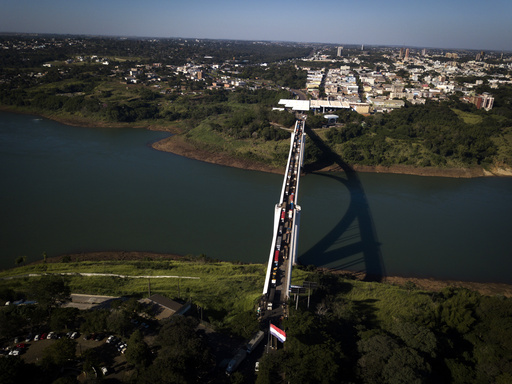
BOGOTA, Colombia — Authorities in Paraguay have detained 26 individuals as part of an operation targeting suspected illegal deforestation activities near the borders with Brazil and Argentina, as reported by Interpol on Monday.
A coordinated effort involving 14 different agencies took place in mid-October, utilizing techniques such as border checks, surveillance of waterways, and aerial forest monitoring. Approximately 1,000 logs were confiscated, including valued quebracho wood known for its density and high tannin levels, according to Interpol.
The agency indicated that 12 businesses were implicated in the purported deforestation and trafficking of native timber species while also identifying two distinct criminal organizations. A spokesperson detailed various offenses, including unlawful logging, the illegal trade of timber, use of counterfeit documents for the illegal wood trade, and various deforestation-related activities. The delay in publicizing these arrests was partly to facilitate additional investigations.
“Illegal deforestation encompasses a broad spectrum of criminal activities, from document fraud to money laundering and corruption,” stated Kat Henn, Interpol’s assistant director of environmental security. “This operation emphasizes the critical necessity for ongoing multi-agency and sustained collaborative efforts across borders to confront the criminal networks that are exploiting our environment for profit.”
Interpol has been enhancing its operations within the Tri-Border region for several years. The agency has characterized this area, marked by two rivers that delineate the states, as particularly prone to a variety of illicit activities due to its numerous access points.
“Organized crime increasingly considers forested regions as operational bases, not only for concealment purposes but also to illegally exploit natural resources,” commented Gimena Sanchez, a human rights advocate from the Washington Office on Latin America. She noted that combating deforestation in South America involves confronting sophisticated transnational organized crime networks.
Deforestation is commonly driven by the conversion of land for cattle ranching or agricultural purposes, as well as logging and mining activities. Such actions contribute to serious environmental repercussions, including soil erosion, loss of biodiversity, heightened flood risks, and the degradation of crucial carbon sinks. Despite some advancements in curtailing deforestation rates, particularly in Brazil and Colombia, Latin America witnessed a loss of 138 million hectares (approximately 341 million acres) of forest between 1990 and 2020, according to a report from the United Nations.
Gabriel Funari, head of the Amazon Observatory of Illicit Economies, noted the emergence of large transnational criminal groups that have expanded operations using drug trafficking profits. For instance, one of Brazil’s major crime syndicates, Primeiro Comando da Capital (PCC), is diversifying investments into various illegal markets like firearms, timber, wildlife, and gold, exploiting trade routes through the Tri-Border area.
Analysts such as Bram Ebus, a consultant for Crisis Group in Latin America, argue that while the direct environmental damages caused by drug trafficking are relatively minor compared to those linked to legal sectors like cattle ranching and industrial agriculture, the laundering of drug money through these legitimate economic activities enhances and accelerates deforestation efforts.
